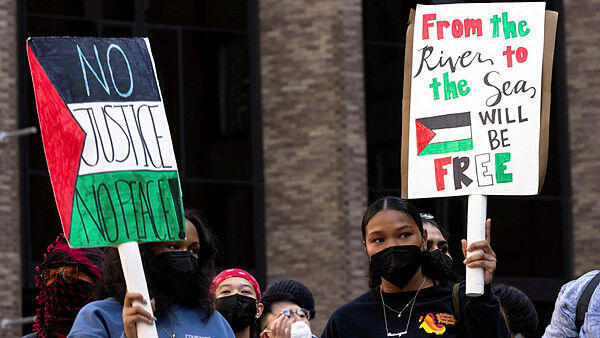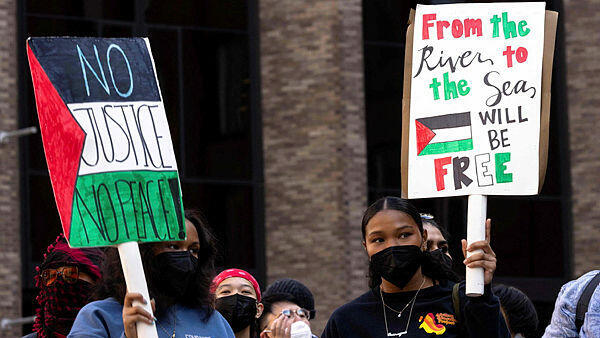
Meta’s content moderation under fire for allowing "River to the Sea" posts
Oversight board decision ignites controversy over political speech and online safety.
Meta does not have to comprehensively remove posts that include the phrase "from the river to the sea," as it is not necessarily a phrase that encourages genocide or violence against Jews and Israel, according to Meta's global oversight board in a decision published on Wednesday.
"While it can be understood by some as encouraging and legitimizing antisemitism and the violent elimination of Israel and its people, it is also often used as a political call for solidarity, equal rights and self-determination of the Palestinian people, and to end the war in Gaza," the board said in its decision. Not everyone on the board agreed with the decision. According to board member Emi Palmor, the minority opinion was that the expression should only be allowed in posts that explicitly state they do not express support for Hamas or violence against Israelis and Jews.
1 View gallery


Pro-Palestinian protest in New York
(Photo by Michael M. Santiago / GETTY IMAGES NORTH AMERICA / AFP)
Since October 7, the phrase "from the river to the sea" has become commonplace in anti-Israel demonstrations and posts. It is identified with support for Hamas and the horrific massacres perpetrated by the organization that day and is considered a call for genocide against Israelis and Jews.
When it examined the issue, the oversight board reviewed Meta's decision not to remove three Facebook posts that mention the phrase. The first was a comment posted on a Facebook video, which included the phrase "#FromTheRiverToTheSea" as a hashtag alongside others like "#DefundIsrael." The second case involved a picture of watermelon slices forming the phrase "from the river to the sea Palestine will be free" in English. The third case was the re-sharing of a post from a community organization in Canada, which used the phrase alongside an expression of support for the Palestinian people and a condemnation of the "senseless slaughter" and the "Zionist Israeli occupiers." In all three cases, users requested the posts be removed, but the requests were rejected by the company's automated tools without human evaluation.
According to the board's decision, Meta was right not to remove the posts because they do not attack Jews or Israelis by calling for acts of violence or exclusion. "They do not break the Violence and Incitement rules nor do they violate Meta’s Dangerous Organizations and Individuals policy as they do not contain threats of violence or other physical harm, nor do they glorify Hamas or its actions." However, according to sources familiar with the matter, the board deliberately chose simple and seemingly innocent posts while avoiding more complex ones.
The board also stated that the expression itself cannot be interpreted as a call for violence against Jews or Israelis or as support for Hamas: "The phrase’s use by this terrorist group with explicit violent eliminationist intent and actions, does not make the phrase inherently hateful or violent - considering the variety of people using the phrase indifferent ways. Its vital that factors such as context and identification of specific risks are assessed to analyze content posted on Meta’s platforms as a whole. Though removing content could have aligned with Meta’s human rights responsibilities if the phrase had been accompanied by statements or signals calling for exclusion or violence, or legitimizing hate, such removal would not be based on the phrase itself, but rather on other violating elements, in the view of the majority of the Board. Because the phrase does not have a single meaning, a blanket ban on content that includes the phrase, a default rule towards removal of such content, or even using it as a signal to trigger enforcement or review, would hinder protected political speech in unacceptable ways."
The board’s decision includes a detailed and biased historical review of the expression's use, claiming it was previously associated with Palestinian aspirations for self-determination and equal rights. In one of the most controversial parts of the review, the board mentions that the phrase appears in the 2017 Hamas charter ("Hamas rejects any alternative for the full and complete liberation of Palestine from the river to the sea"), but immediately afterward notes that it also appeared in the 1977 Likud platform ("Between the sea and the Jordan river, there will only be Israeli sovereignty").
This comparison is inciting: Likud is an Israeli political party under whose rule Sinai was returned to Egypt as part of a peace agreement, the disengagement from Gaza was carried out, and the Oslo Accords were upheld. Hamas is a murderous terrorist organization that aims to commit genocide against Israelis, and even attempted to do so on October 7. Its use of "from the river to the sea" can only be interpreted as a desire for a State of Israel without Jews. Comparing them side by side, as if they are two sides of the same coin, without acknowledging the essential differences between Hamas and Likud, smacks of ignorance at best and anti-Semitism at worst.
Not everyone on the board agreed with the majority decision that the expression in itself does not constitute support for Hamas or the murder of Israelis and Jews, and therefore, posts that include it should only be removed in cases where it appears alongside support for Hamas or violence against Israelis or Jews. "The minority opinion says that after October 7, because the phrase appears in the Hamas charter and there is an increase in its use, the standard should be the opposite," board member Emi Palmor told Calcalist. "Only posts that make it clear that the expression was used not as support for Hamas, violence against Israel, or the massacres of October 7, but as part of a political statement that Palestinians have a right to a state, should be allowed."
Palmor also criticized Meta's information disclosure policy, which prevented the board from a more complete discussion of the contexts in which the phrase was used. "Meta only presented us with information about the posts that remained on the network, so apparently, they are those that do not violate its policy," she explained. "We don't have any information about defamatory posts that the company removed. We don't know, for example, if for every thousand posts in which the phrase appears alone, there are another million in which it appears alongside support for Hamas or the destruction of the State of Israel. Because then I could conclude that anyone who merely mentions the phrase is making it part of mass support for Hamas. Meta doesn't make it possible to truly understand the overall picture of the use of this phrase. Without data, how can you identify a causal relationship or evidence for such a relationship?"














